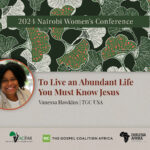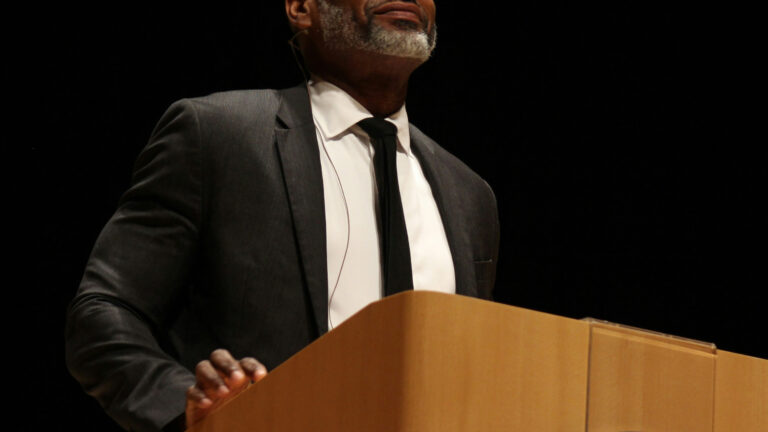Excellent Reformed and Evangelical conferences are held across Africa every year. The TGC Africa Podcast showcases select conferences to encourage and build up the local church across our continent.
This talk was delivered at the 2022 Evangelical and Reformed Conference which is held annually at the Skogheim Conference Center, Port Shepstone, KZN, South Africa. The conference theme was Life in Babylon and Ronald Kalifungwa preached 5 sessions on the first 3 chapters of Revelation calling us to a renewed vision of Jesus and his lasting commitment to his church.
When you think about your church, what is it you think it needs most? A bigger building? A bigger budget? What about what you need most, as an individual Christian? To have more prayers answered? To have more faith? In the book of Revelation the Apostle John, the disciple who Jesus loved, believed that what we need most is a vision of Jesus: the powerful and glorious Jesus. We need to have our hearts and minds saturated with the truth of Jesus’ fearful and wonderful majesty. He is the source of all growth and hop and change. A vision of Jesus is what we need most. An accurate vision of Jesus is what the church needs most.
When we see the glory of Christ, we will have a transforming experience.
In Revelation the vision of Christ we see gives hope to the church and to individual Christians. As Ronald Kalifungwa says, “People going through suffering and difficulty need to see Christ. And when you see him, you will be lifted, you’ll be transformed, you’ll be encouraged, you will have strength to go on.”
The best place to start a study on the book of Revelation is focusing on Jesus whose glory is the ultimate revelation. Allow yourself to rest in the vision of the glory of Jesus. Let that strengthen your heart to keep faithfully following him through trials and temptations until you reach heaven.
Other Content On This Topic
Tomorrow Holds More Than Our Technology Promises
I Believe… In Jesus’ Ascension & Return
Why Did God Give Us The Book Of Revelation?
4 Ways to Read the Book of Revelation
Event: 2022 Evangelical and Reformed Conference
Location: Skogheim Conference Center, Port Shepstone, KZN, South Africa
Transcript
Bible Reading
Please turn in your Bibles to the Book of Revelation, Revelation chapter 1. Our brother, Pastor Ronald Kalifungwa, will be bringing us his first talk on the Book of Revelation, Revelation chapter 1.
Hear the word of God:
The revelation of Jesus Christ, which God gave him to show to his servants the things that must soon take place. He made it known by sending his angel to his servant John, who bore witness to the word of God and to the testimony of Jesus Christ, even to all that he saw. Blessed is the one who reads aloud the words of this prophecy, and blessed are those who hear, and who keep what is written in it, for the time is near.
John to the seven churches that are in Asia:
Grace to you and peace from him who is and who was and who is to come, and from the seven spirits who are before his throne, and from Jesus Christ the faithful witness, the firstborn of the dead, and the ruler of kings on earth.
To him who loves us and has freed us from our sins by his blood and made us a kingdom, priests to his God and Father, to him be glory and dominion forever and ever. Amen. Behold, he is coming with the clouds, and every eye will see him, even those who pierced him, and all tribes of the earth will wail on account of him. Even so. Amen.
“I am the Alpha and the Omega,” says the Lord God, “who is and who was and who is to come, the Almighty.”
I, John, your brother and partner in the tribulation and the kingdom and the patient endurance that are in Jesus, was on the island called Patmos on account of the word of God and the testimony of Jesus. I was in the Spirit on the Lord’s day, and I heard behind me a loud voice like a trumpet saying, “Write what you see in a book and send it to the seven churches, to Ephesus and to Smyrna and to Pergamum and to Thyatira and to Sardis and to Philadelphia and to Laodicea.”
Then I turned to see the voice that was speaking to me, and on turning I saw seven golden lampstands, and in the midst of the lampstands, one like a son of man, clothed with a long robe and with a golden sash around his chest. The hairs of his head were white, like white wool, like snow. His eyes were like a flame of fire, his feet were like burnished bronze, refined in a furnace, and his voice was like the roar of many waters. In his right hand he held seven stars, from his mouth came a sharp two-edged sword, and his face was like the sun shining in full strength.
When I saw him, I fell at his feet as though dead. But he laid his right hand on me, saying, “Fear not, I am the first and the last, and the living one. I died, and behold I am alive forevermore, and I have the keys of Death and Hades. Write therefore the things that you have seen, those that are and those that are to take place after this. As for the mystery of the seven stars that you saw in my right hand, and the seven golden lampstands, the seven stars are the angels of the seven churches, and the seven lampstands are the seven churches.” (Revelation 1:1-20)
Here ends the reading of the word of God.
A Vision Of Christ
Please turn your bibles to Revelation chapter 1. The chapter has already been read for us so I won’t be reading it again, but I will certainly be preaching from it.
I think it was in 2018 that I was last here. And at that stage, I was preaching from the book of Revelation, just giving to us something of a broad sweep across the book. And when we were deciding what I should speak on, Michael was actually hesitant about having me speak from Revelation again but then, could find no better book to speak on the church than Revelation, and especially the second and third chapters. So we’ll be reflecting on that.
My subject is the vision of Christ and the Church of Christ and we’ll be looking at that from this great book. And one of you might be wondering, “Why go to a book that appears to be closed and complicated to study about Christ and to study about his church?” Wouldn’t it have made more sense to go to a book like Colossians that speaks about Christ in very exalted terms? Couldn’t we have gone to a book like Ephesians and First Corinthians chapter 12 and 13 and 14 to study about the church? Why go to a book that has been the subject of much controversy?
Well, it is called Revelation. It was not intended to keep anything closed but to reveal them, to reveal Christ and to teach us something about the church.
The purpose of the book of Revelation, as you may know, was for the Lord to speak to the suffering churches in Asia Minor. They were undergoing persecution. It is believed that this was during the reign of Emperor Domitian, so they were going through an extremely difficult time. They were not always under persecution; there were always good times as well as bad times. but here, they were in great distress.
John himself, through which the Revelation comes, was in exile on the island of Patmos and from there, the Lord gave him this revelation he was to deliver to the church. I imagine he was in quite a beautiful place and with beautiful surroundings. He was on an island, most likely on the Mediterranean Sea, and if you’ve been to those parts, they are beautiful. But the Lord here reveals something much more beautiful to him. The church needed to see that. And you heard me right – the church needed to see that.
And so, he gives them a revelation in symbolic language, language meant to be described and language that would, therefore, lift their vision from from the difficulties the sufferings they were undergoing to something that would lift their spirits, encourage them, embolden them, enable them – not so much to look at what they were going through – but to look at the Christ that was in control, that would defeat their enemies, that would bring them to glory.
So what we find here is basically a prophecy. And prophets didn’t just speak about the future, they spoke about the present, they spoke into the present and this prophecy was going to do just that. So the Lord reveals this message through John to teach the church, to warn the church, to exhort the church, to comfort the church, that she would have, as one commentator would put it, “A worthy and triumphant pilgrimage through the wilderness of this world into the eschatological Promised Land.”
And so, this is what we’ll be reflecting on and we are going to begin with a vision of Christ. People going through suffering and difficulty need to see Christ. And if you are going through difficulty, you’re going through suffering, and I don’t know what you are suffering, what burdens you bear, they’re weighing you, down you’re discouraged – you need to see Christ. And when you see him, you will be lifted, you’ll be transformed, you’ll be encouraged, you will have strength to go on.
Paul, in First Corinthians chapter 3:18 says, “But we all, with unveiled face, beholding as in a mirror the glory of Christ, are being transformed into the same image from glory to glory, just as by the Spirit of the Lord.” (2 Corinthians 3:18)
And Paul was suggesting there that when we see the glory of Christ, we will have a transforming experience. When we do see the glory and are not transformed by it, it’s probably because we haven’t seen as we ought to see.
My prayer is that as we work through this, we will see as we must see, as we ought to see.
Jesus As A Member Of The Trinity
Now there are several things John reveals about the glory of Christ in this chapter and I will lay them before us under a number of points, all beginning with the name, Jesus. The first is this: Jesus is identified as a member of the Trinity. Jesus is identified, he is introduced as a member of the Trinity. This is how John puts it from verse 4,
“Grace to you and peace from him who is and who was and who is to come, and from the seven spirits who are before his throne…” And then he writes in verse 5, “…and from Jesus Christ the faithful witness, the firstborn from the dead, and the ruler over the kings of the earth. To him who loved us and washed us from our sins in his own blood…” (Revelation 1:4-5)
This revelation was from the Trinity. First of all, it was from him “who is, who was and who is to
come.” It is from the Father, if you like, who identifies as being eternally self existent. Who was, who is, who is to come. He is from everlasting. He lives or exists in one, eternal present. He is to come. He is the Father who is eternally self-existent.
This letter, this revelation, is from the seven spirits who we read about in verse 4, which is a familiar designation for the Holy Spirit in the book of Revelation. The “seven spirits” is the Holy Spirit and because seven, the number seven, is related to completeness, to fullness, this is no doubt a pointer to the fullness of his work and the variety of his operations.
But it’s not just from the Father and the Spirit. We read in verse 5, “…and from Jesus Christ….” And from Jesus Christ. Jesus Christ is equated with the Father and The Spirit here, isn’t he? In the same way that he is equated to them in the baptismal formula. You remember the Lord teaching his disciples to baptize those that they win to the Lord in the name of the Father and of the Son and of the Holy Spirit – here we find again, the Trinity, and Jesus is among the persons of the Trinity.
This affirms his divinity, doesn’t it? The Father is God, the Spirit is God, the Lord Jesus Christ is God. No wonder that he refers to himself as the Alpha and the Omega. No wonder he refers to himself as the beginning and the end. He is the beginning of history, he is the sustainer of history and he is the controller of history. He rules all things according to the counsel of his will. Ultimately, the ruler is not Domitian or Nero. Ultimately, the ruler is not any of the emperors of Rome. The ruler is Jesus.
Needless to say, because he is the ruler, he has allowed what the church is going through and he is in control of what the church is going through. Let all their enemies conspire to destroy them and they will find that they are under the protection of this Lord. And ultimately, he will destroy all their enemies. He will destroy that Great Serpent, the dragon and all his helpers. The two beasts and Babylon – he will destroy them and give victory to his church. He is the Lord, he is God, he is in control. Jesus is identified as a member of the Trinity.
Jesus Is Addressed By Three Exalted Titles
Secondly, Jesus is addressed by three exalted titles, three exalted titles. And we read about them here in verse 5 as well as verse 6. The revelation is, “From Jesus Christ, the faithful witness, the firstborn from the dead, and the ruler over the kings of the earth.
To Him who loved us and washed us from our sins in His own blood, and has made us kings and priests to His God and Father, to Him be glory and dominion forever and ever. Amen. (Revelation 1:5-6)
First, he is the faithful witness. We read that in verse 5. He is the faithful witness. In other words, he manifests God with a reliability, with a truthfulness that is only of God, that cannot fail. In Hebrews 1:3, we are told concerning the Lord Jesus Christ that, “He is the brightness of God’s glory, the exact representation of his being.” He wasn’t made in the image of God, he is the image of God, the exact representation of God.
In John 1:18 John says concerning the Lord Jesus that, “he has made him known.” He has made him known. And when you look at the meaning of that word, it’s translated there as “being made known” but the word is equivalent to what preachers do when they exegete the Scriptures. They go to the Bible, not with their ideas, not with their opinions, they go to the Bible to find what God has put there, to dig it out, to bring it out, just as God had indicated, just as God had written it, and to declare it without changing anything, without adding anything, without subtracting anything from it.
To faithfully declare it to the people – that is what preachers do and this is what Jesus came to do. He came to exegete God. He came to declare God just as he is. And because he is the exact representation of the being of God, he gives the exact expression of who that God is. No one else can do that. He is God. He can therefore declare God.
It is John who also says that he is, “from the bosom of the Father.” (John 1:18) It gives the idea of one who knows the Father very well, exactly. He can therefore tell us about him in very exact terms, very faithfully. He is the faithful witness.
He is also the firstborn from the dead. That’s the other title he is the first born from the dead. He is the first one to be resurrected, never to die again. The first one to defeat death. Having experienced it and having been risen from the dead, he will never die again. Death can never touch him.
He wasn’t necessarily the first one to rise; in the course of his ministry he had raised a few people from the dead. And when he resurrected, there were others who were brought from the dead, but they’ve all since died again. Death has touched them. They are under the ground, as it were, they’ve gone back to the dust. For death will never touch the Lord Jesus Christ again. He has conquered death, he has overcome death. Up from the grave he arose with a mighty triumph, with a mighty triumph over his foes, and death counted among those foes.
The third title is the ruler over the kings of the earth, the ruler over the kings of the earth. In chapter 19 and verse 16 he is referred to as the “King of kings and the Lord of lords.” (Revelation 19:16) All earthly kings receive authority from him and are accountable to him. He is God’s firstborn which just means he is the king, the supreme leader. He is God’s first king, the highest of the kings of the earth, to use the language of Psalm 89:27.
In the eyes of the people who lived at that time, the great kings were the emperors of Rome who would have been considered greater than Caesar Augustus. So Nero, Domitian – there were many others. These were great men: wealthy, pompous, feared, but John here introduces one who was the ruler over the kings of the earth.
Nebuchadnezzar, who was mentioned this morning, was a great king, so much greater than any who might have ruled before him, but even Nebuchadnezzar was small, insignificant compared to this one. And I’m sure brother Warren will go on to demonstrate that for us. The ruler of the kings of the earth.
Well these are the three exalted titles mentioned here concerning Jesus.
Jesus Is The Soon Coming King
Thirdly, Jesus is identified as the soon coming king, the soon coming King. We have to go to verse 7 to read that, “Behold, He is coming with clouds, and every eye will see Him, even they who pierced Him. And all the tribes of the earth will mourn because of Him. Even so, Amen.” (Revelation 1:7)
Behold, he is coming. There’s a note of certainty there. He is coming. You might have heard, you might have known that he was coming, but because your sufferings go on and on and on, it might seem to you that he wasn’t. You might have been told by the scoffers that that was not true, that was a lie. The sun comes up every morning and sets every evening, the days carry on as they have always done, and this Jesus of yours is not showing up. Come on, forget about him! Bow the knee to the Roman Emperor and it will be well.
“No, no,” says John. “Look, behold, he is coming. He is coming. He is coming with the clouds.” He won’t do it secretly or privately. You won’t be raptured out of this place and disappear into nothingness. Even here, where you are experiencing the suffering, where you are carrying the load of difficulty, you will see him. He is coming.
And every eye will see him, every eye will see him. You will see him. Forget the scoffers, you will see him. Pontius Pilate will see him. Those soldiers, who put a crown of thorns on his head and who put a robe and knelt before him to mock him, will see him. Those soldiers, who nailed him to the cross and have had him hung there for hours on end, will see him. The scoffers, who have been busy trying to convince you that there was no Jesus, and that if there was, he’s dead, they might as well forget him, he may never come back, he will never come back, they will see him.
“Every eye will see him, even they who pierced him…” (Revelation 1:7)
As if to say, these agents of Satan did not defeat Jesus. He will come back as a king, as a ruler. If that is unclear now, look, he will come with the clouds. Do you know of any King who has come upon the scene of history riding on the clouds? Well this is how he will come. They didn’t defeat him, he defeated them and they will see him as the victor and all the tribes of the earth will mourn because of him. They will mourn.
This is a mourning of anguish, of misery. It’s a mourning of wasted opportunity. It’s a mourning of regret: regret that they did not repent, regret that they did not esteem him, regret that they insulted him, regret that they did not own him as Lord, regret that they didn’t see value in him and in his death. They will mourn.
Is there someone here who will be among those that will mourn because they have not looked to Jesus as Lord or bowed their knee to him as saviour? Is there someone here?
They will mourn, all the tribes of the earth, even those that believe that they have their own kind of God and their own kind of prophet and their own kind of saviour. The Lord of the Christians is just one Lord, they have their own. They have their own truth, their own manner of salvation. Yours is just one alternative. Even they, John says, all the tribes of the earth will mourn because of him; not because of Muhammad, because of Jesus. Not because of Hare Krishna, because of Jesus. The soon coming King comes to introduce himself as the one and only before for whom every nation must bow.
Jesus’ Glory Is The Revelation
We must hurry on and observe in the fourth place, Jesus’s glory is revealed as the content of God’s revelation. We find here the revelation and the revelation according to verse 1 is the revelation of Jesus Christ. That doesn’t just mean the things Jesus reveals but that he is what is
revealed. And that revelation is highlighted here in chapter 1. It will go on to be expounded in the rest of the book. Let’s take a look at what he says about Jesus Christ here in verse 13. In verse 12 he says,
“Then I turned to see the voice that spoke with me. And having turned I saw seven golden lampstands, and in the midst of the seven lampstands One like the Son of Man, clothed with a garment down to the feet and girded about the chest with a golden band. His head and hair were white like wool, as white as snow, and His eyes like a flame of fire; His feet were like fine brass, as if refined in a furnace, and His voice as the sound of many waters; He had in His right hand seven stars, out of His mouth went a sharp two-edged sword, and His countenance was like the sun shining in its strength. And when I saw Him, I fell at His feet as dead. But He laid His right hand on me, saying to me, “Do not be afraid; I am the First and the Last. I am He who lives, and was dead, and behold, I am alive forevermore. Amen. And I have the keys of Hades and of Death.” (Revelation 1:12-18)
Richard Brooks has written a commentary in the Welwyn series on Revelation and he comments on this. He is describing John. He says, “He turned around the Mediterranean sights that he had been getting used to in his exile; beautiful sights, exalted sights. But those sights soon began to fade. Why? Because a greater sight, a greater sight had come about that immediately met his gaze and increasingly ravished his sight. And that sight was the most glorious view of Jesus himself. And this Jesus was walking among the seven golden lampstands. (You will see about those.) He was walking there and he reveals what we have just read to John.”
There are eight things John saw about Jesus. First, he saw one like the Son of Man. We’ve come across that language once again in Daniel chapter 7:13, “One like the Son of Man.” And this speaks of the real humanness of Christ. We’ve already seen him as a member of the Trinity. We have seen him in the glory of his deity. Now we see real manhood, real humanness.
He is high, he is God, but he has not chosen to live without identifying with his people. He has not stopped identifying with his people. He is Emmanuel, after all, God with us. And here, although in a glorified state, he has not forgotten about his people. He is still the Son of Man. He will always be in the midst of his people. He is present where two or three are gathered in his name. He was present with John, even out there on the island of Patmos in exile.
He sympathizes and empathizes with them. He is touched with the feelings of their infirmities. He is no longer humiliated, he is glorified. He will bring them to glory. The suffering saints may presently feel dishonourable, but he is there with them, he is watching them, he sympathizing with them. He is the Son of Man with them and he will bring them all to glory, just as he was brought to glory. He saw one like the Son of Man.
Secondly, he saw one who had on a garment down to his feet, speaking with dignity. One like the Son of Man, clothed with a garment down to his feet. And this speaks of one who, having finished his work as a priest, (and priests tended to dress that way – in long garments that went down to their feet) having finished his work as a priest, he is now here as a dignified being. And that garment speaks of dignity, it speaks of greatness, it speaks of a priest who has finished his work.
Thirdly he is girded about the chest with a golden band. (Revelation 1:13) You read a similar thing in Daniel 10:5 and this speaks of kingship. It speaks of deity. It speaks of the picture we read about in Genesis, which is commented on in the book of Hebrews, which speaks of Christ as being a priest after the order of Melchizedek. Melchizedek was both king and priest and the Lord Jesus Christ is being presented in that form when he is said to be girded about the chest with a golden band. It’s kings who wear such bands but this man is both king and, as we have seen, he is also a priest.
Fourthly, his head and hair were “white like wool, as white as snow”, we read in verse 14. The whiteness speaks about his purity; the purity of his divinity, the purity of his humanity and it speaks of a purity that can never be tainted. It’s an eternal purity. It does not decay, it does not grow old, it does not lose its power. It is unending purity.
Fifthly, what about the feet? We are told about the feet. The feet represent his resistless providence as he works out all his purpose. “His feet,” verse 15, “were like the fine brass, as if refined in a furnace.” They are like fine brass. He treads down his enemies; he executes all his judgments. His enemies will not win. They cannot not win.
The voice which we read about in verse 15 as well, is “as the sound of many waters.” The voice is the God who makes himself heard in words of salvation, in words of comfort, in words of warning, in words of judgment. He will and he must be heard.
And then his countenance: it’s absolute perfection, too intense for sinful eyes to behold. In verse 16, “He had in his right hand seven stars. Out of his mouth went a sharp two-edged sword and his countenance was like the sun shining in its strength.” Take a moment to look at the sun and see how long it would take for you to hold your gaze. Not more than a second and you begin to feel blinded. Well, that was the experience John had as he looked at that vision.
Jesus’ Vision And It’s Effect
This brings us to Jesus’s vision and its affect on John. John fell down as dead. You see that in verse 17. He saw this vision of Christ. You can’t see what John saw there and not experience what John experiences here – he fell at his feet as dead.
In my first pastorate, some more than 30 years ago, we had a member, someone joined us from Nigeria. Good man, but he seemed like one who walked with Jesus. Now we do all walk with Jesus as Christians but you’ll understand what I mean, because he often told us stories about his encounters with Christ. He once told me a story about sitting on a table with Jesus and having a meal with him. You know, he made it sound like, you know, he ran with Christ, he had drinks with Christ, you know. There was no sense of being in the presence of God – a presence that inspires awe and reverence. Nothing like that.
And we find many in our day and age who don’t seem to be moved by a sense of awe – the understanding that God is great and Christ is great and exalted doesn’t inspire any fear. They have a casual relationship with Christ. There is no falling down at the feet of Christ. John was a great man, but look at what the vision of Christ does to him. “I fell at his feet as dead.” (Revelation 1:17) He was overwhelmed by this presence. John here was not being uncivilized, he was not being old-fashioned. This is the only reasonable way of responding to such an exalted presence!
Do you have similar experiences? And I don’t mean that you are always found on your feet. I also mean the sense that led John to go down at the feet of Christ as though dead. Sometimes you can be overwhelmed without necessarily falling down. The point is, you do have the sense that makes you feel like going down, kneeling before him to acknowledge his greatness, his majesty, to acknowledge something of his thrice holiness.
Do you have something of this experience? Or have you ever had something of what Isaiah had in chapter 6 when he saw the vision of God and he felt dirty and he acknowledged, “I am a man of unclean lips.” (Isaiah 6:5)
Or have you had the experience Peter had after he and his brother had been trying to fish all night and were catching nothing and then Jesus shows up and says, “Throw your net over to the other side!” And so they do and before long, they caught so much fish. Now you would expect them to just forget about themselves and start dancing and jumping and speaking in tongues. They do none of that. Peter turns to Jesus and says, “Go away from me. I am a sinful man.” (Luke 5:8) He saw greatness, he saw majesty, he saw a more than humanity there – and that’s the effect it had on him. Do you sometimes feel something of that?
Jesus’ Counsel To John
Well finally, Jesus’s counsel to John, that’s the sixth thing I want us to know, Jesus’s counsel to John. “When I saw him,” he says, “I fell at his feet as dead, but he laid his hand on me saying to me, “Do not be afraid, do not be afraid, John. I am the first and the last. I am he who lives and was dead and behold I am alive forever, amen. And I have the keys of Hades and of Death.” (Revelation 1:17-18)
“Don’t be afraid. You would be damned if I decided to have you damned. You would go to Hades if I decided you must go to Hades. I hold the keys of Hades and death, but don’t worry, John, you’re not going to die. Don’t worry, John, you are not going to be lost. Don’t worry, John, you will live, even though you die, you will live and why will you? Because I am he who lives and was dead and behold, I am alive forever. You are in the midst, you are in the presence of one who controls life, who holds life. And more than that, you are in the presence of one who is life itself. So, John, don’t be afraid. I am here. I am here. I am here.”
John needed to hear those words, the churches he writes to needed to hear those words, the church of all ages needed to to hear those words. You, my friends, need to hear those words. Otherwise, you will be overwhelmed by fear, by a sense of hopelessness and especially, when you go through suffering, you will have no hope. You need to hear these words.
And this is why he says to John, “Write the things you have seen and the things that will take place after this.” (Revelation 1:19) Write them down, write them. And so, John did and that is why we are able to read these words.
Our Need For A Vision Of Jesus’ Glory
I want to end with a few important thoughts and points. The first is our need for a vision of Jesus in his glory, our need for a vision of Jesus in his glory.
Now I imagine the people of God represented in these seven churches, which were also representing the universal church, here they are, going through suffering. And they are feeling the weight of that suffering very very keenly, and they are praying too. What might have been their prayers?
Now I’ll be saying in a moment that they were probably praying for the Lord to reveal himself to them. I’ll come back to that in a moment. But these are normal human beings like you and I, normal people like you and I. And even though they were believers, some might have been tempted to simply pray for relief and for relief’s sakes – nothing more. “If you love us, free us from this pain. And if you love us, remove this difficulty. And if you love us, remove Domitian, kill him, so we may be safe again.”
They were human. They might have prayed in that way. Some may not have thought about Jesus, even in their moment of need, just like so many of us. You are in need but when you pray, you don’t even think about Jesus.
Well, the Lord knew what they needed: they needed a view of himself in that moment. And I’m saying, brothers and sisters, we need a vision of Jesus in his glory. When you read the Bible, you must look for Jesus. When you hear preaching, you must look for Jesus. When you pray you must pray to Jesus. You must ask for Jesus, ask for a vision of his glory. And that will strengthen you and, as I hinted earlier on from Paul’s teaching, that will transform you. We need this more than anything else.
Secondly, a vision of Jesus in his glory will humble us as it did John. It will humble you. Maybe you’re very very proud. Well, I know I am, and I need to see greater things, greater people. I need to see Jesus. It’s Dr Lloyd Jones who used to say when you feel proud, read biographies. Read about George Whitfield and John Wesley and Daniel Roland. Read about them and you will feel small, you’ll be humbled. But here is an even better biography you must read about: Jesus Christ. A vision of Jesus in his glory will humble us.
Thirdly, a vision of the glory of Christ will fill us with praise, will fill us with praise. Isn’t this book something of John’s praise of Christ, something of John’s song about the person of Christ and the triumph of Christ and how he gives victory to his church and brings them into his glory? The vision of Christ will fill us with his glory.
And finally, a vision of the exalted Christ will inspire heightened obedience to him. When you work in a company and you have a number of bosses above you, the word that carries the most weight is the word of the highest boss. And here before us we have the highest – the Lord Jesus Christ, the King of kings and the Lord of lords. When you see him in his glory and he says, “Go,” you will go. “Do!” You will do. “Come!” You will come. He almost has no need to say “worship” because when you see him, you will worship him. Amen.
[Music] Song:Reformation Hymn by Bob Kauflin
We will trust God’s Word alone, where His perfect will is known;
Our traditions shift like sand while His Truth forever stands.
We will live by faith alone, clothed in merit not our own;
All we claim is Jesus Christ and His finished sacrifice.
Glory be, glory be to God alone
Through the church He redeemed and made His own.
He has freed us, He will keep us till we’re safely home
Glory be, glory be to God alone!
We are saved by grace alone—undeserved, yet freely shown;
No accomplishment on earth can achieve the second birth.
We will stand on Christ alone, the unyielding Cornerstone;
Nations rage and devils roar, still he reigns forevermore
Glory be, glory be to God alone
Through the church He redeemed and made His own.
He has freed us, He will keep us till we’re safely home
Glory be, glory be to God alone!
Glory be, glory be to God alone
Through the church He redeemed and made His own.
He has freed us, He will keep us till we’re safely home
Glory be, glory be to God alone!
“To him who loves us and has freed us from our sins by his blood and made us a kingdom, priests to his God and Father, to him be glory and dominion forever and ever. Amen.” (Revelation 1:5b-6)
Ronald Kalifungwa has been in pastoral ministry for thirty six years and is presently the pastor of the Lusaka Baptist Church in Lusaka, Zambia. ln addition to this, he teaches Christian Reasoning and Rhetoric at the African Christian University and is also presently serving as the acting Principal of the Lusaka Ministerial College. Ronald is married to Sarah and together they have five children (three biological and two fostered), a daughter in love(law) and 4 grandchildren.














